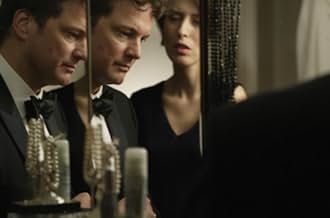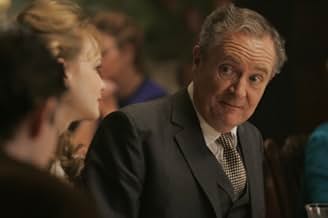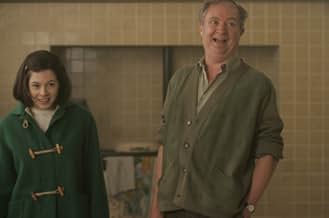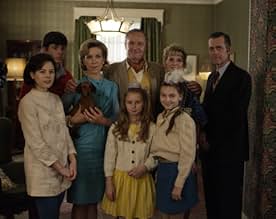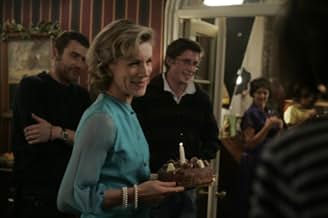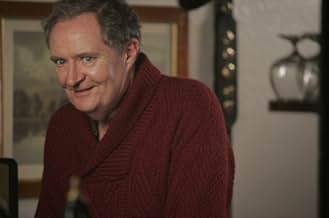CALIFICACIÓN DE IMDb
6.8/10
4.8 k
TU CALIFICACIÓN
La historia de los recuerdos contradictorios de un hijo sobre su padre moribundo.La historia de los recuerdos contradictorios de un hijo sobre su padre moribundo.La historia de los recuerdos contradictorios de un hijo sobre su padre moribundo.
- Dirección
- Guionistas
- Elenco
- Premios
- 1 premio ganado y 12 nominaciones en total
- Dirección
- Guionistas
- Todo el elenco y el equipo
- Producción, taquilla y más en IMDbPro
Opiniones destacadas
At the end of the last conversation I had with my father before he died, he called me a horse's ass. That conversation was the final topper to a very complicated relationship as my father was a man that I feared as a child and pretty much disliked as an adult. Yet, some of the fondest memories I have of my life involve my father and our times together.
I guess all relationships between fathers and sons could best be described as knotty, but the one shown in this film, I must admit, hit very close to home. Perhaps that's why I enjoyed the film as much as I did, and it appears from the comments of viewers and critics that I enjoyed it far more than most viewers.
The basic story, I'm sure, has been repeated countless times throughout history and will be repeated countless times in the future. Blake, a highly successful writer and editor, never received the recognition of "a job well done" from his father. Arthur is a popular physician and raconteur who constantly failed to show his admiration for his son's profession.
Blake realized at an early age that his father had been having a long-term affair with his aunt, and this knowledge colored every part of their relationship. One thing that Blake cannot understand is why his mother stays married to his father for he is sure that she, also, is aware of her husband's relationship with her sister.
The story begins in the present, but most of it is told in flashbacks as Arthur is dying. The adult Blake is played by Colin Firth with just the right amount of distance and depression. He is not a happy man because he never has been able to come to terms with his feelings for his father. Teenaged Blake is played beautifully by Matthew Beard. It is this Blake that we see most of in the film, and his performance is impressive.
Juliet Stevenson is a wonderful actress, and she gives this film a strong, quiet - but not necessarily longtime suffering - performance as Blake's mother. She is one of those women whom you never realize her strength and resourcefulness until push comes to shove.
Jim Broadbent may be a touch over the top as Arthur, but, for me, he hits the nail on the head. We all have public and private faces. Arthur rarely reveals the private one. I found myself liking him in spite of myself.
As I said, this film turned out to be very personal to me. I found myself sometimes being amazed at how much Arthur was like my own father and Blake so much like myself. Even without the personal insight, I think you will find this a rewarding look at the bond between two strong, yet totally different men - OR - the bond between two strong, completely similar men. Fathers and sons - will that connection ever be fully understood?
I guess all relationships between fathers and sons could best be described as knotty, but the one shown in this film, I must admit, hit very close to home. Perhaps that's why I enjoyed the film as much as I did, and it appears from the comments of viewers and critics that I enjoyed it far more than most viewers.
The basic story, I'm sure, has been repeated countless times throughout history and will be repeated countless times in the future. Blake, a highly successful writer and editor, never received the recognition of "a job well done" from his father. Arthur is a popular physician and raconteur who constantly failed to show his admiration for his son's profession.
Blake realized at an early age that his father had been having a long-term affair with his aunt, and this knowledge colored every part of their relationship. One thing that Blake cannot understand is why his mother stays married to his father for he is sure that she, also, is aware of her husband's relationship with her sister.
The story begins in the present, but most of it is told in flashbacks as Arthur is dying. The adult Blake is played by Colin Firth with just the right amount of distance and depression. He is not a happy man because he never has been able to come to terms with his feelings for his father. Teenaged Blake is played beautifully by Matthew Beard. It is this Blake that we see most of in the film, and his performance is impressive.
Juliet Stevenson is a wonderful actress, and she gives this film a strong, quiet - but not necessarily longtime suffering - performance as Blake's mother. She is one of those women whom you never realize her strength and resourcefulness until push comes to shove.
Jim Broadbent may be a touch over the top as Arthur, but, for me, he hits the nail on the head. We all have public and private faces. Arthur rarely reveals the private one. I found myself liking him in spite of myself.
As I said, this film turned out to be very personal to me. I found myself sometimes being amazed at how much Arthur was like my own father and Blake so much like myself. Even without the personal insight, I think you will find this a rewarding look at the bond between two strong, yet totally different men - OR - the bond between two strong, completely similar men. Fathers and sons - will that connection ever be fully understood?
This is a beautifully written, well acted but above all wonderfully directed film looking at a man who learns about himself by finding out about his father. Colin Firth plays a real writer who wrote an auto-biographical novel about his relationship with his father played by Jim Broadbent. It's not a spoiler to say that the father is dying because that diagnosis is given very early on. While the family waits for him to die, events take Firth's memories effortlessly through his past showing him played very well by young actors at 8 and 17.
The events are funny and moving but restrained within a believable reality. Firth learns to live with his father's behaviour as we see that he isn't perfect either. It's positive about life without being sentimental, terrific film.
The events are funny and moving but restrained within a believable reality. Firth learns to live with his father's behaviour as we see that he isn't perfect either. It's positive about life without being sentimental, terrific film.
Reel Inspiration Review: When Did You Last See Your Father.
When Did You Last See Your Father ignores standard Hollywood wisdom: Keep the title short and catchy. Avoid flashbacks. The action should be external, not internal. Make films that appeal to teenage boys. And most of all, don't do stories about old, dying people.
In an article about what sells in Hollywood, an agent moans that she just can't read one more story about coping with aging, dying parents. The market was glutted with them. I couldn't help but think that this must be a very timely and heartfelt theme since it was popping up in so many scripts. Is it possible that there's an adult audience hungry for stories that help them deal with the hard issues in their lives?
When Did You Last See Your Father is based on Blake Morrison's heart wrenchingly honest autobiographical bestseller. It is the story of the forty year old writer's attempts to resolve his troubled relationship with his father as he deals with his immanent death. Collin Firth courageously portrays the estranged son's sometimes unlikable sentiments of resentment, frustration, confusion, and disappointment tinged with compassion for his fading father. Being home brings back memories of coming of age in his charismatic father's shadow and discovering some hard realities about the man. Thanks to Jim Broadbent's dynamic performance, we can see why the son was once proud of him - even though he never felt his father's approval. Blake goes on an internal journey where he finds that he has some of his father's weaknesses. He must decide what kind of man he is to become. At first, the film's lengthy title seems to accuse the grown son of neglecting his father. But by the end, we discover that the title actually asks, "When was the last time you really saw your father - without your own feelings of inadequacy and resentment getting in the picture? When was the last time you saw love?"
Movie Blessings! Jana Segal reelinspiration dot blogspot dot com
When Did You Last See Your Father ignores standard Hollywood wisdom: Keep the title short and catchy. Avoid flashbacks. The action should be external, not internal. Make films that appeal to teenage boys. And most of all, don't do stories about old, dying people.
In an article about what sells in Hollywood, an agent moans that she just can't read one more story about coping with aging, dying parents. The market was glutted with them. I couldn't help but think that this must be a very timely and heartfelt theme since it was popping up in so many scripts. Is it possible that there's an adult audience hungry for stories that help them deal with the hard issues in their lives?
When Did You Last See Your Father is based on Blake Morrison's heart wrenchingly honest autobiographical bestseller. It is the story of the forty year old writer's attempts to resolve his troubled relationship with his father as he deals with his immanent death. Collin Firth courageously portrays the estranged son's sometimes unlikable sentiments of resentment, frustration, confusion, and disappointment tinged with compassion for his fading father. Being home brings back memories of coming of age in his charismatic father's shadow and discovering some hard realities about the man. Thanks to Jim Broadbent's dynamic performance, we can see why the son was once proud of him - even though he never felt his father's approval. Blake goes on an internal journey where he finds that he has some of his father's weaknesses. He must decide what kind of man he is to become. At first, the film's lengthy title seems to accuse the grown son of neglecting his father. But by the end, we discover that the title actually asks, "When was the last time you really saw your father - without your own feelings of inadequacy and resentment getting in the picture? When was the last time you saw love?"
Movie Blessings! Jana Segal reelinspiration dot blogspot dot com
The writer Blake Morrison (Colin Firth) has a non-resolved relationship with his bragger and wolf father Arthur Morrison (Jim Broadbent). However, when he is diagnosed with a terminal intestine cancer, Blake leaves his wife and children and travel to the village where he spent his childhood and adolescence to help his mother and his sister to take care of Arthur along his last days. The location brings recollections of his problematic relationship with his father.
"And When Did You Last See Your Father?" is a sensitive movie about father and son problematic relationship. Through the recollections of Blake, the viewer understand the many unresolved situations that made him indifferent (or even hating) his flawed father that loved him indeed. In the end, it dawns on him that his father is gone and he will never see him again; and he grieves and regrets the lost moments he had along his life to stay with him. And you, when did you last see your father? My vote is six.
Title (Brazil): "Quando Você Viu Seu Pai Pela Última Vez?" ("When Did You Last See Your Father?")
"And When Did You Last See Your Father?" is a sensitive movie about father and son problematic relationship. Through the recollections of Blake, the viewer understand the many unresolved situations that made him indifferent (or even hating) his flawed father that loved him indeed. In the end, it dawns on him that his father is gone and he will never see him again; and he grieves and regrets the lost moments he had along his life to stay with him. And you, when did you last see your father? My vote is six.
Title (Brazil): "Quando Você Viu Seu Pai Pela Última Vez?" ("When Did You Last See Your Father?")
I'm astonished by the miserable so-and-sos above who complain about the "overdone production" on this movie.
Anand Tucker and his crew have taken obvious pains to elevate a conventional story into a visual tone poem. Every shot shines with polish, care, and attention. If it said "A Ridley Scott Movie" at the beginning, the reviews would read "Scott brings his usual visual excellence to bear."
A terrific little movie, elevated out of its class, with nice performances (I especially enjoyed the underused Gina McKee, who is practically luminous in every scene).
Now, the rest of you get back to watching and praising the drab and visually tedious kitchen sink junk that the British film industry does "so" well...
Anand Tucker and his crew have taken obvious pains to elevate a conventional story into a visual tone poem. Every shot shines with polish, care, and attention. If it said "A Ridley Scott Movie" at the beginning, the reviews would read "Scott brings his usual visual excellence to bear."
A terrific little movie, elevated out of its class, with nice performances (I especially enjoyed the underused Gina McKee, who is practically luminous in every scene).
Now, the rest of you get back to watching and praising the drab and visually tedious kitchen sink junk that the British film industry does "so" well...
¿Sabías que…?
- TriviaMatthew Beard wore brown coloured contact lenses in order to look more like Colin Firth.
- ConexionesFeatured in Starfilm (2017)
- Bandas sonorasCold Cold Feeling
Written by JM Robinson
Published by EMI Music Publishing Ltd
Performed by T-Bone Walker
Licensed courtesy of EMI Records Ltd
Selecciones populares
Inicia sesión para calificar y agrega a la lista de videos para obtener recomendaciones personalizadas
- How long is When Did You Last See Your Father??Con tecnología de Alexa
- Is this movie based on a book?
- What was going on in the controversial bathtub scene?
Detalles
- Fecha de lanzamiento
- Países de origen
- Sitios oficiales
- Idioma
- También se conoce como
- When Did You Last See Your Father?
- Locaciones de filmación
- Productoras
- Ver más créditos de la compañía en IMDbPro
Taquilla
- Presupuesto
- USD 8,000,000 (estimado)
- Total en EE. UU. y Canadá
- USD 1,077,273
- Fin de semana de estreno en EE. UU. y Canadá
- USD 39,210
- 8 jun 2008
- Total a nivel mundial
- USD 2,752,471
- Tiempo de ejecución1 hora 32 minutos
- Color
- Mezcla de sonido
- Relación de aspecto
- 2.35 : 1
Contribuir a esta página
Sugiere una edición o agrega el contenido que falta

Principales brechas de datos
By what name was La última vez que vi a mi padre (2007) officially released in Canada in English?
Responda






